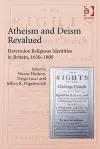
Atheism and Deism Revalued
2 authors - Hardback
£150.00
Wayne Hudson is Research Professor at the Public and Contextual Theology Strategic Research Centre at Charles Sturt University, Australia. He has also held academic positions at the Australian Centre for Christianity and Culture in Canberra, the University of Tasmania, Oxford, Utrecht, McGill University, and Griffith University. Specialising in European philosophy, politics and history, he has contributed widely to academic scholarship and is considered the leading authority on the philosopher Ernst Bloch. He won the Australian National Teaching Award for Arts and Humanities in 2004, and has published two books on English deism: The English Deists: Studies in Early Enlightenment (2009) and Enlightenment and Modernity The English Deists and Reform (2009). Diego Lucci is an Associate Professor of History and Philosophy at the American University in Bulgaria. His research mainly focuses on the philosophy of the Enlightenment and the history of Jewish-Gentile relations. He is the author of two books: Scripture and Deism: The Biblical Criticism of the Eighteenth-Century British Deists (2008), and The Jews, Instructions for Use: Four Eighteenth-Century Projects for the Emancipation of European Jews (with Paolo Bernardini, 2012). His articles have appeared in the Journal for Eighteenth-Century Studies, Hebraic Political Studies, and the Intellectual History Review. Jeffrey R. Wigelsworth teaches in the Department of Humanities and Social Sciences at Red Deer College, Canada. He is the author of Deism in Enlightenment England: Theology, Politics, and Newtonian Public Science (2009). In addition to this book, he has written articles on Anthony Collins, Thomas Chubb and Thomas Morgan, deists and Newtonianism, and to several examinations of John Toland. Outside of his work on deism are studies in the history of science and its public reception: Science and Technology in Medieval European Life (2006) and Selling Science in the Age of Newton: Advertising and the Commodification of Knowledge (2010).